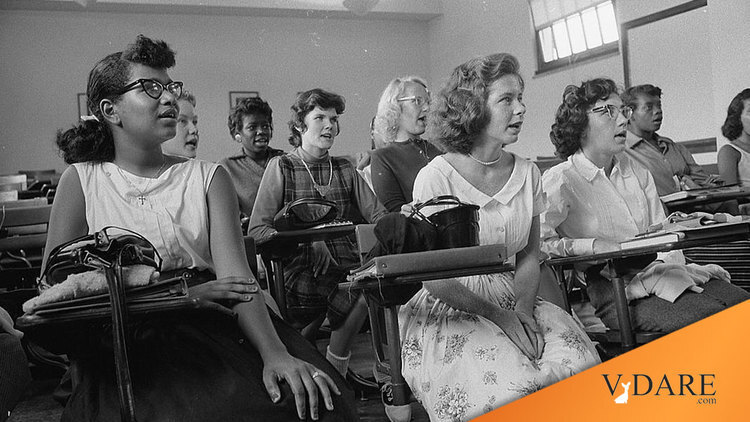
How Was American Race History Taught In 1968?
By Steve Sailer
08/27/2023
From the Washington Post opinion section, a 71-yea- old reviews what she learned in 1968 about black-white issues in her 11th grade U.S. History course in a steel mill suburb of San Bernardino, CA (e.g., a pretty representative public school outside of the South). In summary, contrary to contemporary assumptions, she learned a lot about race from a liberal, pro-black perspective 55 years ago:
What my 1960s U.S. history class taught me about slavery — and life
By Katy Roberts
August 27, 2023 at 6:30 a.m. EDTThe heavy cardboard boxes began arriving via UPS in late spring. They were hastily taped, and the contents — a jumble of beat-up books, faded pamphlets and dusty folders — looked long overdue for the recycling bin. The paper crumbled as I sorted through it.
But this was not disorganized clutter. It was a richly curated archive of teaching materials for U.S. history classes in the late 1960s. My 11th-grade teacher of the subject, Terry Friedlander, who is now 81, agreed to part with this half-century-old time capsule only because I volunteered to take it. …
Judging by what is in the boxes now sitting in my garage, it seems hard to believe when people my age say they didn’t learn about the history of slavery and racial issues in high school.
Most people, of course, can’t remember much of what they learned in history class, so they tend to retcon impressions based on the today’s legends about how racist everything was until late last week.
The pamphlet series Mr. Friedlander used was published by the Harvard Social Studies Project and picked up in districts across the country in the late 1960s and early 1970s. It was only one of many such curriculums, which had names such as the American Problems Series and New Dimensions in American History.
That’s pretty much my recollection: Outside the South, American history has been taught in a liberal, pro-black manner for 50+ years. I can recall at Catholic elementary school in the 1960s my reader textbook featuring a chapter on Harriet Tubman and the Underground Railroad. I don’t recall the precise year, but I was young to have a vivid picture in my head when I read the title of a steam locomotive powering through an endless tunnel heading North, and then being disappointed to discover “Underground Railroad” was a metaphor.
Granted, it sounds like the author’s teacher was about 26 and liberal, with a German and/or Jewish name. But he was definitely representative of the new wave.
One caveat I have, though, is that older history books tended to have a pro-Southern bias about the abuses of Reconstruction (lots of harping about crooked Republican “carpetbaggers” and the like). But the motivation tended to be pro–Democratic Party rather than anti-black. History books in the 1970s tended to be written by New Deal partisans, so they tended to be sympathetic to their fellow Democrats down through history, even Southern whites.
What we didn’t hear all that much about was what’s becoming the one thing everybody under 50 can remember about the New Deal: redlining.
